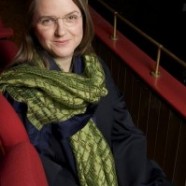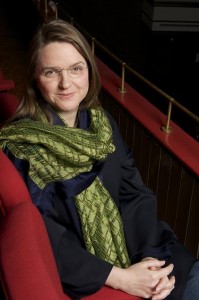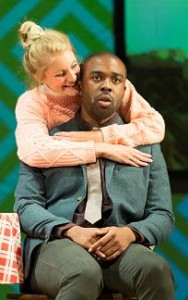Watford Palace
Watford Palace Theatre’s Artistic Director, Brigid Larmour, talks about their current rep season, the digital revolution and multi-platform theatre.
What led you to develop the Ideal World season?
I think theatres need to create space for reflection on what is happening in the society around them.
I was struck by how quickly the digital revolution is changing almost every area of our lives. It is the fastest technological revolution in human history. At times it feels as if we are curiously passive about it; rather than human culture driving the revolution, there’s a race to exploit every new technological development and then afterwards we work out how to live with it. So while it is an incredibly exciting period in which to be alive, there is also plenty of opportunity for unintended consequences. I wanted to ask some playwrights to reflect on these themes, somehow creating a small pause for thought in the rush forwards. So I commissioned the three plays for the Ideal World season.
Have you worked previously with all the writers?
Yes, in different ways. Gary Owen and Stacey Gregg are Creative Associates of Watford Palace Theatre. I have commissioned and directed two of Gary’s plays for the Palace, ‘We That Are Left’ and ‘Mrs Reynolds and the Ruffian’. I met Stacey when she had just left Cambridge, and did some dramaturgical work on her play ‘Ismene’, and helped her get an agent. I directed a playreading of her beautiful play ‘Robe and Crown’ on the Palace stage, and we supported the development of her play ‘Lagan’ by giving the cast and director some time with movement director Kate Flatt, another Watford Palace Theatre Creative Associate, ahead of its run at the Oval House. Emma (E. V.) Crowe’s play ‘The Young Pretender’ was a coproduction for us with nabokov, another Creative Associate of Watford Palace Theatre, at the Edinburgh Festival (and subsequently Watford Palace Theatre ), directed by Joe Murphy, Artistic Director of nabokov, and Joe has directed ‘Virgin’, which is coproduced by us in Association with nabokov.
Why the choice to do it as a rep season?
We wanted audiences to have plenty of opportunities to see all three plays, three very different ways of responding to the theme. There are lots of times when you can see all three in one day. We also wanted to give audiences a chance to hear about the plays through word of mouth – if each play only has a short run then it is easier for people to miss them!
All the plays are about the digital world/technology – it seems theatres themselves are under pressure to extend the production beyond the stage through technology – do you think the majority of theatres are equipped to meet the challenge; is there is enough/too much focus on making multi-platform theatre?
I think there are three main ways in which theatre can take advantage of digital technologies. The first one is creative – it becomes another tool in the creative kit – and theatremakers large and small are, as you would expect, dreaming up endless exciting ways of using it to enhance, or to transform, the audience’s experience of live theatre. This doesn’t need to be expensive – you can do extraordinary things with a laptop.
The second way is giving audiences ‘outside the room’ the chance to eavesdrop on live performance, whether in a cinema or a theatre like ours with cinema equipment, watching NT Live of the Bolshoi, or live streamed as we did with our coproduction with Rifco Arts of ‘MummyJi Presents’ via the BBC’s The Space. But the cost of the kit (including server capacity) for this is certainly not cheap.
The third way is giving the audience a more direct sense of involvement in the work, through communicating on twitter, or opening up the rehearsal process through blogs, or online Q and A’s.
All of these routes are exciting in terms of finding and engaging with audiences. I think theatre is in a constant state of evolution, and people will use different styles and platforms to tell different stories and reach different audiences.
How hopeful do you feel about the future of British theatre and what advice would you have for new companies?
I think there is enormous creative energy in the theatre, and a lot of resilience. For newer or smaller companies I’d say be true to your values. Be clear about what it is that you uniquely are offering an audience, and who that audience is, and how and why you think you can get them to come and see you. If you are looking for state subsidy, be clear about why.
The Ideal World season continues at Watford Palace Theatre until 19th October http://www.watfordpalacetheatre.co.uk/page/idealworld








